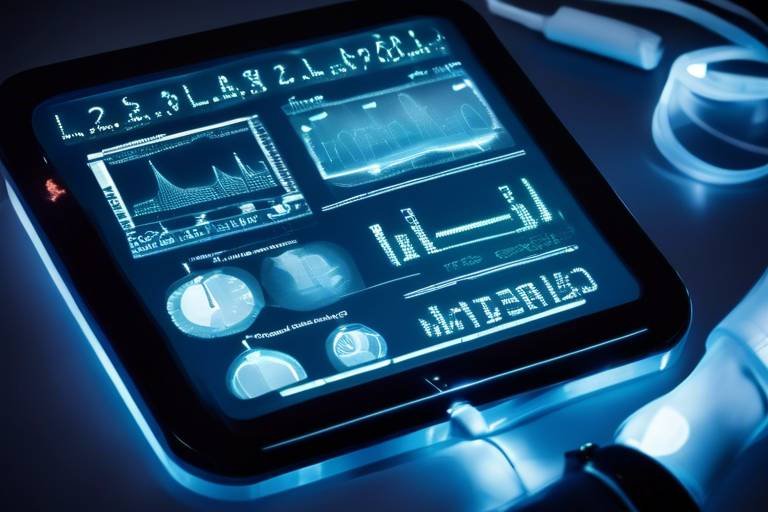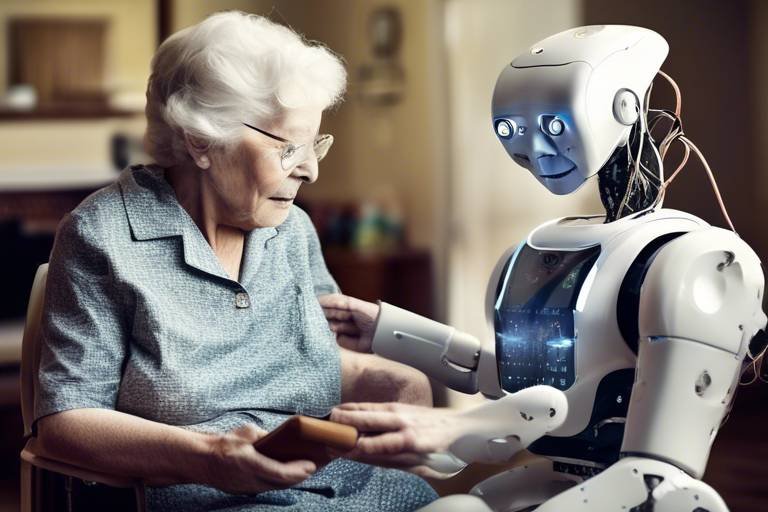The Future of AI-Driven Healthcare Solutions
The world of healthcare is on the brink of a radical transformation, and at the center of this revolution is Artificial Intelligence (AI). Imagine a world where diseases are diagnosed faster than ever, treatments are personalized to fit individual needs, and patient monitoring is seamless and continuous. Sounds like a sci-fi movie, right? But this is not just a dream; it's the future that AI promises to deliver in the healthcare sector. As we delve into this article, we'll explore the incredible innovations AI is bringing to diagnostics, personalized medicine, and patient monitoring, along with the challenges and ethical considerations that come with it. Buckle up, because the future of healthcare is not just bright; it's dazzling!
AI technologies are revolutionizing diagnostics by enhancing accuracy and speed. Imagine a machine that can analyze thousands of medical images in the blink of an eye, identifying diseases that even seasoned physicians might miss. That's the power of machine learning algorithms! These sophisticated systems are designed to learn from vast amounts of data, continuously improving their ability to detect anomalies. For instance, AI can help in identifying early signs of conditions like cancer, diabetes, and heart disease, paving the way for timely interventions.
The integration of AI in personalized medicine is a game-changer, allowing for tailored treatment plans based on individual patient data. Gone are the days of a one-size-fits-all approach; now, treatments can be customized to fit the unique genetic makeup and health history of each patient. This level of personalization not only enhances the effectiveness of treatments but also minimizes the risk of adverse effects. The implications of AI-driven customization in healthcare are profound, as it promises to improve patient outcomes significantly.
AI's role in genomic analysis is pivotal for understanding genetic disorders. With the ability to analyze vast amounts of genetic data, AI algorithms can identify patterns and correlations that would be nearly impossible for humans to discern. This capability is especially crucial in determining the best treatment strategies for conditions rooted in genetic anomalies. As we continue to unlock the secrets of our DNA, AI stands as a powerful ally in the quest for better health.
Effective data interpretation is crucial in genomics. The sheer volume of data generated through genomic sequencing can be overwhelming. However, AI can simplify complex data sets, making them accessible for healthcare professionals. By providing clear insights and actionable information, AI enables doctors to make informed decisions quickly, ultimately benefiting patient care.
While the benefits of AI in genomic analysis are immense, they also raise significant ethical questions. Issues of data privacy and consent are paramount, especially when dealing with sensitive genetic information. As healthcare providers and researchers harness the power of AI, they must also navigate the ethical landscape to ensure that patient rights are respected and upheld.
Predictive analytics powered by AI can forecast patient outcomes and disease trends. This technology allows healthcare providers to anticipate issues before they arise, leading to improved preventive care strategies. For example, by analyzing historical patient data, AI can predict which patients are at risk for certain conditions, enabling timely interventions that can save lives.
AI technologies are enhancing patient monitoring through wearables and remote sensing devices. Continuous data collection from these devices provides healthcare professionals with real-time insights into a patient's health status. This not only improves patient care but also leads to better health outcomes. With AI, the future of patient monitoring looks promising, as it allows for proactive management of chronic diseases and timely responses to acute health issues.
Wearable devices equipped with AI can track vital signs in real-time. Imagine wearing a smartwatch that not only tells time but also monitors your heart rate, blood pressure, and even stress levels. This technology has a profound impact on early detection and chronic disease management, empowering patients to take charge of their health.
Remote monitoring solutions are becoming essential in healthcare. AI facilitates effective communication between patients and healthcare providers, ensuring timely interventions. For instance, if a patient's vital signs indicate a potential issue, an alert can be sent to their healthcare provider, prompting immediate action. This level of connectivity and responsiveness can be a game-changer in managing health conditions.
- What is AI in healthcare? AI in healthcare refers to the use of artificial intelligence technologies to analyze data, improve diagnostics, personalize treatment, and enhance patient monitoring.
- How does AI improve diagnostics? AI improves diagnostics by analyzing vast amounts of medical data quickly and accurately, helping to identify diseases earlier than traditional methods.
- What are the ethical concerns surrounding AI in healthcare? Ethical concerns include data privacy, consent for using personal health information, and the potential for bias in AI algorithms.
- How can AI personalize medicine? AI can analyze individual patient data, including genetic information, to tailor treatment plans that are more effective for each person.

AI in Diagnostics
AI technologies are revolutionizing diagnostics by enhancing accuracy and speed. Imagine a world where diseases are detected not just earlier, but with a precision that minimizes misdiagnoses. This is the reality that artificial intelligence is crafting in the healthcare sector. With the integration of machine learning algorithms, healthcare professionals can now analyze medical data in ways that were previously unimaginable. These algorithms sift through mountains of data, identifying patterns and anomalies that might escape even the most trained eyes.
One of the most striking advancements is in the realm of imaging. AI systems can now interpret X-rays, MRIs, and CT scans with remarkable efficiency. For instance, a study showed that AI algorithms could detect certain cancers with an accuracy rate of over 90%, surpassing many human radiologists. This not only accelerates the diagnostic process but also enhances the confidence of healthcare providers in their decisions. The ability to identify diseases at an early stage can significantly improve patient outcomes, making AI a game changer in diagnostics.
Moreover, AI's capability extends beyond just imaging. It is increasingly being utilized in pathology, where it helps in analyzing biopsy samples. By employing deep learning techniques, AI can differentiate between benign and malignant cells, providing pathologists with a robust second opinion. This is particularly vital in cases where the stakes are high, as timely and accurate diagnoses can lead to life-saving interventions.
However, the implementation of AI in diagnostics is not without its challenges. There are concerns regarding data privacy and the ethical use of patient information. As AI systems require vast amounts of data to learn and improve, ensuring that this data is handled responsibly is paramount. Healthcare institutions must navigate these ethical waters carefully, balancing innovation with the need for patient confidentiality.
To illustrate the impact of AI in diagnostics, consider the following table that summarizes the key benefits:
| Benefit | Description |
|---|---|
| Increased Accuracy | AI algorithms can analyze data with a precision that often exceeds human capabilities. |
| Speed | AI can process and interpret data much faster than traditional methods, leading to quicker diagnoses. |
| Early Detection | AI systems can identify diseases at earlier stages, improving treatment options and outcomes. |
| Cost Efficiency | By reducing misdiagnoses and improving operational efficiency, AI can lower overall healthcare costs. |
In conclusion, AI in diagnostics is not just a trend; it’s a transformative force that is reshaping how we approach healthcare. As we continue to harness the power of AI, we must remain vigilant about the ethical implications and ensure that patient care remains at the forefront of these technological advancements. The future of diagnostics is bright, and with AI leading the charge, we can look forward to a healthier tomorrow.

Personalized Medicine
In the ever-evolving landscape of healthcare, stands out as a groundbreaking approach that tailors treatment plans to individual patients. Imagine a world where your healthcare isn't just a one-size-fits-all solution, but rather a unique blueprint designed specifically for you. This is the promise of AI-driven personalized medicine, where artificial intelligence analyzes a wealth of patient data to craft customized therapies that enhance efficacy and minimize side effects.
At the heart of personalized medicine lies the ability to process and interpret complex data sets. With the integration of AI, healthcare providers can utilize various data points, including genetic information, lifestyle choices, and previous medical history, to create a comprehensive profile of each patient. This multifaceted view enables practitioners to make informed decisions that are not only based on clinical guidelines but also tailored to the individual's unique circumstances. The implications of this are vast, leading to improved patient outcomes and a more efficient healthcare system.
One of the most exciting aspects of personalized medicine is its potential in managing chronic diseases. For conditions like diabetes, heart disease, and cancer, treatment plans can be adjusted in real-time based on continuous monitoring and data analysis. For instance, AI can analyze how a patient responds to a particular medication and suggest modifications that might enhance effectiveness. This dynamic approach is akin to having a personal coach who not only motivates you but also adjusts your training regimen based on your performance and progress.
Furthermore, the integration of AI in personalized medicine extends to drug development. Traditional drug discovery processes can be lengthy and costly, often resulting in treatments that are effective for only a subset of patients. However, with AI, researchers can analyze vast datasets to predict which drug formulations will work best for specific genetic profiles. This not only accelerates the development timeline but also increases the likelihood of successful outcomes. In essence, AI acts as a powerful ally in the quest for more effective treatments.
Despite its incredible potential, personalized medicine is not without challenges. Issues surrounding data privacy and security are paramount, especially when dealing with sensitive genetic information. Patients must be assured that their data will be handled ethically and responsibly. Moreover, healthcare providers need to be equipped with the necessary tools and training to interpret AI-generated insights effectively. This brings us to the ethical considerations that are increasingly relevant in this field.
In conclusion, personalized medicine represents a significant leap forward in the healthcare industry, driven by the capabilities of AI. The ability to tailor treatments to individual needs not only enhances the patient experience but also paves the way for more effective healthcare solutions. As we continue to embrace this innovative approach, it’s essential to navigate the accompanying challenges with care, ensuring that we prioritize patient well-being and ethical standards in this exciting new frontier of medicine.
- What is personalized medicine? Personalized medicine is a medical model that tailors treatment plans to individual patients based on their unique genetic makeup, lifestyle, and medical history.
- How does AI contribute to personalized medicine? AI analyzes large datasets to identify patterns and insights that help healthcare providers create customized treatment plans for patients.
- What are the benefits of personalized medicine? Benefits include improved treatment efficacy, reduced side effects, and enhanced patient satisfaction through tailored healthcare solutions.
- Are there any risks associated with personalized medicine? Yes, risks include data privacy concerns and the need for healthcare providers to be trained in interpreting AI-generated data.

Genomic Analysis
In the rapidly evolving landscape of healthcare, stands out as a beacon of hope, especially when powered by artificial intelligence. Imagine having the ability to understand the intricate blueprint of human life encoded in our DNA. AI's role in genomic analysis is not just pivotal; it's revolutionary. By harnessing the power of machine learning algorithms, researchers can sift through mountains of genetic data with unprecedented speed and accuracy. This capability allows for the identification of genetic disorders that were once deemed elusive, paving the way for more effective treatment strategies.
Consider this: a single human genome contains approximately 3 billion base pairs. Analyzing this vast amount of information manually would take a lifetime, but AI can do it in a fraction of the time. By employing sophisticated algorithms, AI can detect patterns and anomalies that might escape the human eye. This is akin to finding a needle in a haystack, but with AI, the search becomes efficient and precise. The implications of this technology are profound, as they can lead to earlier diagnoses and personalized treatment plans tailored to the unique genetic makeup of each patient.
However, the benefits of AI in genomic analysis extend beyond just speed and accuracy. One of the most exciting aspects is its ability to integrate diverse data sources. For example, AI can combine genomic data with clinical records, lifestyle information, and environmental factors to create a comprehensive profile of a patient. This holistic approach not only enhances our understanding of diseases but also informs the development of targeted therapies. Imagine a world where cancer treatments are customized based on an individual's genetic profile, drastically improving outcomes and minimizing side effects.
Despite these advancements, effective data interpretation remains a challenge. The complexity of genomic data can be overwhelming, and healthcare professionals often struggle to extract actionable insights. Here, AI plays a crucial role by simplifying complex data sets, making them more accessible and understandable. For instance, AI can generate visualizations that highlight key genetic variations, helping doctors make informed decisions quickly. This is not just about data; it's about transforming information into knowledge that can save lives.
Nonetheless, the integration of AI in genomic analysis also raises significant ethical considerations. As we delve deeper into the genetic underpinnings of diseases, questions about data privacy and consent become paramount. Who owns the genetic data? How is it used, and who has access to it? These are critical issues that must be addressed to ensure that the benefits of genomic research are realized without compromising individual rights. It’s essential for stakeholders, including researchers, healthcare providers, and patients, to engage in discussions about ethical practices in genomic data handling.
In conclusion, AI's role in genomic analysis is reshaping the future of healthcare. By enhancing our ability to analyze genetic data, it opens doors to personalized medicine that could revolutionize treatment strategies. However, as we embrace these advancements, we must remain vigilant about the ethical implications and strive for a balance between innovation and privacy. The journey of genomic analysis is just beginning, and with AI at the helm, the possibilities are limitless.
- What is genomic analysis? Genomic analysis refers to the examination of a person's DNA to identify genetic variations that may contribute to health conditions.
- How does AI improve genomic analysis? AI enhances genomic analysis by rapidly processing vast amounts of data, identifying patterns, and generating insights that aid in diagnosis and treatment.
- What are the ethical concerns surrounding genomic data? Ethical concerns include data privacy, consent, and ownership of genetic information, which must be carefully managed to protect individuals' rights.
- Can AI help in personalized medicine? Yes, AI can analyze genomic data alongside other factors to create tailored treatment plans that are specific to individual patients.

Data Interpretation
In the ever-evolving landscape of healthcare, stands as a critical pillar, especially in the realm of genomics. With the advent of AI technologies, the complexity of genetic data is no longer a daunting barrier for healthcare professionals. Imagine a world where vast amounts of genetic information can be distilled into actionable insights, much like turning a dense forest of trees into a clear path for navigation. AI algorithms are the guiding lights in this intricate forest, illuminating the way for clinicians and researchers alike.
AI's prowess in data interpretation allows for the analysis of intricate patterns within genetic data, making it possible to identify mutations and understand their implications on health. This capability is akin to having a super-sleuth on your team, capable of sifting through mountains of evidence to uncover the hidden clues that lead to a diagnosis. By employing machine learning techniques, AI can recognize trends and correlations that might elude even the most seasoned experts, thus enhancing diagnostic accuracy and speed.
One of the most significant advantages of AI in data interpretation is its ability to process data at an unprecedented scale. For instance, consider the following table that illustrates the differences in data processing capabilities:
| Method | Data Volume | Processing Time |
|---|---|---|
| Traditional Analysis | Up to 1,000 samples | Weeks |
| AI-Powered Analysis | Millions of samples | Hours |
This table clearly demonstrates how AI can handle an immense volume of genetic data much faster than traditional methods. As a result, healthcare providers can make timely decisions, which is crucial in scenarios where every moment counts, such as in cancer treatment or rare genetic disorders.
Moreover, AI simplifies complex data sets, translating them into formats that are more understandable for healthcare professionals. Through intuitive dashboards and visualizations, clinicians can grasp the significance of genetic findings without needing to be data scientists themselves. This democratization of data interpretation not only empowers healthcare providers but also enhances patient care by facilitating informed decision-making.
However, the integration of AI into data interpretation is not without its challenges. Questions surrounding the accuracy of AI predictions and the potential for bias in algorithms need to be addressed. It’s essential for healthcare professionals to remain vigilant, ensuring that AI tools are continually validated against clinical outcomes. After all, the stakes are high when it comes to patient health, and the last thing anyone wants is to rely on a faulty interpretation of data.
In conclusion, AI's role in data interpretation is transforming the way genetic information is analyzed and utilized in healthcare. By providing rapid, accurate insights and simplifying complex datasets, AI is paving the way for more effective treatments and improved patient outcomes. As we look to the future, the synergy between human expertise and AI capabilities will undoubtedly lead to groundbreaking advancements in genomic medicine.
- What is data interpretation in genomics? Data interpretation in genomics involves analyzing genetic information to understand its implications for health and disease.
- How does AI enhance data interpretation? AI enhances data interpretation by processing vast amounts of genetic data quickly, identifying patterns, and providing actionable insights.
- Are there risks associated with using AI in data interpretation? Yes, risks include potential biases in algorithms and the accuracy of AI predictions, which must be continuously validated.
- What role do healthcare professionals play in AI-driven data interpretation? Healthcare professionals utilize AI tools to inform their clinical decisions, ensuring that patient care is based on accurate and timely information.

Ethical Considerations
The advent of AI in genomic analysis brings forth a plethora of that cannot be overlooked. As we harness the power of artificial intelligence to decode genetic information, we must grapple with questions surrounding data privacy, informed consent, and the potential for misuse of sensitive information. Imagine a world where your genetic data could be accessed without your knowledge—it's a daunting thought, isn't it?
One of the primary concerns is the privacy of patient data. Genetic information is inherently personal, and the implications of its exposure could be profound. For instance, if a patient's genetic predisposition to certain diseases became public knowledge, it could lead to discrimination by employers or insurance companies. To mitigate these risks, robust data protection measures must be implemented. This includes encryption of genetic data and strict access controls to ensure that only authorized personnel can view sensitive information.
Informed consent is another critical issue. Patients often provide genetic data with the understanding that it will be used for research or treatment. However, as AI systems evolve and data is shared across platforms, the original purpose of consent can become blurred. Patients may not fully understand how their data will be used, leading to potential ethical dilemmas. Therefore, it is essential for healthcare providers to ensure that patients are not only informed but also genuinely comprehend the implications of their consent.
Moreover, there is the risk of algorithmic bias in AI systems. If the data used to train these systems is not diverse, it may lead to skewed results that disproportionately affect certain populations. This raises questions about fairness and equity in healthcare access and treatment. AI systems should be designed to be inclusive, taking into account a wide range of genetic backgrounds to avoid perpetuating existing health disparities.
Lastly, the potential for misuse of genetic data cannot be ignored. With the rise of genetic testing services, there’s a growing concern about how this data might be utilized beyond healthcare—like in law enforcement or even for genetic engineering. This slippery slope highlights the need for clear regulations and guidelines governing the use of genetic data, ensuring that it serves the greater good without infringing on individual rights.
In summary, as we continue to explore the intersection of AI and genomics, we must remain vigilant about these ethical considerations. By fostering open discussions and implementing stringent regulations, we can harness the transformative power of AI while safeguarding the rights and privacy of individuals.
- What are the main ethical concerns regarding AI in healthcare?
The main concerns include data privacy, informed consent, algorithmic bias, and the potential misuse of genetic information. - How can patient data privacy be ensured?
Implementing robust data protection measures, including encryption and strict access controls, is crucial to safeguarding patient data. - What is informed consent in the context of AI and genomics?
Informed consent means that patients understand how their genetic data will be used and the implications of sharing it. - Why is algorithmic bias a concern?
Algorithmic bias can lead to unfair treatment and health disparities if AI systems are trained on non-diverse data sets.

Predictive Analytics
Predictive analytics is a game changer in the healthcare landscape, leveraging the power of artificial intelligence to forecast patient outcomes and identify disease trends before they manifest. Imagine being able to predict a health crisis before it happens—this is what AI-driven predictive analytics is making possible. By analyzing vast amounts of data, including patient history, lifestyle factors, and environmental influences, AI can provide insights that were previously unimaginable. This capability is not just about crunching numbers; it’s about saving lives and optimizing healthcare resources.
One of the most exciting aspects of predictive analytics is its ability to improve preventive care strategies. For instance, healthcare providers can use AI algorithms to identify patients at high risk for chronic diseases such as diabetes or heart disease. By flagging these individuals early, practitioners can implement targeted interventions, such as lifestyle changes or medication adjustments, to mitigate risks. This proactive approach not only enhances patient outcomes but also reduces healthcare costs in the long run.
The integration of predictive analytics into healthcare systems is akin to having a crystal ball for patient care. It allows for a more personalized approach, tailoring treatments and interventions based on predicted outcomes. However, it’s essential to understand that while predictive analytics can offer valuable insights, it is not a replacement for human intuition and clinical expertise. Instead, it serves as a powerful tool that complements the skills of healthcare professionals.
To illustrate the impact of predictive analytics, consider the following table that summarizes key benefits and applications in the healthcare sector:
| Benefit | Application |
|---|---|
| Early Detection | Identifying patients at risk for diseases such as cancer or cardiovascular issues. |
| Resource Optimization | Improving allocation of healthcare resources based on predicted patient needs. |
| Personalized Treatment Plans | Customizing interventions based on individual patient data and predicted outcomes. |
As we move forward, the future of predictive analytics in healthcare looks promising. However, it’s crucial to address the challenges that come with it, such as data privacy and the need for robust algorithms that can accurately interpret complex datasets. The marriage of technology and healthcare is not without its hurdles, but the potential benefits far outweigh the challenges. With continued innovation and ethical considerations, predictive analytics will undoubtedly reshape how we approach patient care, making it more efficient and effective.
In conclusion, predictive analytics powered by AI is not just a trend; it’s a revolution in healthcare. By enabling early interventions and personalized care, it holds the key to a healthier future for all. Are you ready to embrace this transformative change in healthcare?
- What is predictive analytics in healthcare?
Predictive analytics in healthcare refers to the use of AI and data analysis techniques to forecast patient outcomes and identify potential health risks before they occur.
- How does predictive analytics improve patient care?
By providing insights into patient health risks, predictive analytics allows for early interventions, personalized treatment plans, and overall better management of healthcare resources.
- What data is used in predictive analytics?
Predictive analytics utilizes a variety of data, including electronic health records, patient demographics, lifestyle factors, and historical health trends.

AI in Patient Monitoring
In today's fast-paced world, patient monitoring has taken a giant leap forward, thanks to the innovative capabilities of artificial intelligence. Imagine a world where your health is continuously monitored, not just during doctor visits but around the clock. This is not science fiction; this is the reality we are stepping into. With the advent of AI technologies, patient monitoring has become more efficient, accurate, and proactive, leading to a new era of healthcare where timely interventions can save lives.
AI technologies are enhancing patient monitoring in various ways, particularly through the use of wearable devices and remote sensing technologies. These devices collect a plethora of health data, from heart rates to blood sugar levels, and transmit this information to healthcare providers in real-time. This continuous stream of data allows for immediate analysis and response, ensuring that any anomalies are quickly addressed. For instance, if a patient’s heart rate spikes unexpectedly, the healthcare provider can be alerted instantly, allowing for rapid intervention. This kind of proactive care can drastically reduce the risk of complications and hospitalizations.
One of the most exciting aspects of AI in patient monitoring is the integration of wearable technology. Devices like smartwatches and fitness trackers are no longer just tools for fitness enthusiasts; they are becoming essential components of patient care. These wearables are equipped with AI algorithms that can track vital signs in real-time, providing insights into a patient's health status without the need for constant hospital visits. For example, a wearable device might monitor a patient's heart rhythm and alert them if irregularities are detected, prompting them to seek medical attention before a serious issue arises.
Moreover, the rise of remote patient monitoring solutions is transforming how healthcare is delivered. With AI facilitating effective communication between patients and healthcare providers, the traditional barriers of distance and time are being dismantled. Patients can now receive care from the comfort of their homes, while healthcare professionals can monitor their progress without the constraints of a physical office. This is particularly beneficial for patients with chronic conditions who require ongoing supervision. The convenience of remote monitoring not only enhances patient satisfaction but also leads to better health outcomes.
As we delve deeper into the realm of AI-driven patient monitoring, it's essential to consider the implications of such technology. While the benefits are substantial, there are challenges that need to be addressed, such as data security and patient privacy. The collection of sensitive health information raises important questions about who has access to this data and how it is used. Ensuring that patient data is protected is paramount, as any breach could compromise not only individual privacy but also public trust in healthcare systems.
In conclusion, the integration of AI in patient monitoring is reshaping the healthcare landscape. From wearables that track vital signs to remote monitoring solutions that facilitate ongoing care, AI is making healthcare more accessible and effective. As we continue to embrace these technologies, the focus must remain on balancing innovation with ethical considerations, ensuring that patient care remains at the forefront of this exciting evolution.
- What is AI in patient monitoring? AI in patient monitoring refers to the use of artificial intelligence technologies to track and analyze patient health data in real-time, enhancing the ability to provide timely interventions and personalized care.
- How do wearable devices contribute to patient monitoring? Wearable devices collect health metrics such as heart rate and activity levels, using AI to analyze this data and alert healthcare providers to any concerning changes.
- What are the benefits of remote patient monitoring? Remote patient monitoring allows healthcare providers to oversee patients' health from a distance, improving access to care, enhancing patient engagement, and reducing hospital visits.
- Are there privacy concerns with AI in healthcare? Yes, the use of AI in healthcare raises important privacy concerns regarding the security of sensitive patient data. It is crucial to implement robust data protection measures to safeguard patient information.

Wearable Technology
In today's fast-paced world, has emerged as a game-changer in healthcare, transforming the way we monitor our health. Imagine having a personal health assistant strapped to your wrist, constantly tracking your vital signs and alerting you to potential health issues before they escalate. That's the power of wearable devices! These gadgets, such as smartwatches and fitness trackers, are not just trendy accessories; they are essential tools that enhance our understanding of personal health.
Wearable technology utilizes advanced sensors and AI algorithms to collect real-time data on various health metrics. From heart rate and blood pressure to sleep patterns and physical activity, these devices provide a wealth of information that can help users make informed decisions about their health. For instance, a smartwatch can notify you if your heart rate exceeds a certain threshold during exercise, prompting you to take a break or seek medical advice. This level of real-time monitoring is invaluable, especially for individuals with chronic conditions.
Moreover, the integration of AI in wearables allows for personalized health insights. By analyzing the data collected, AI can identify trends and make recommendations tailored to individual needs. For example, if the device notices a pattern of increased blood pressure during stressful periods, it might suggest relaxation techniques or lifestyle changes. This personalized approach not only empowers users but also fosters a proactive stance toward health management.
As we delve deeper into the realm of wearable technology, it's essential to consider its impact on chronic disease management. Devices designed for patients with conditions like diabetes or hypertension can provide continuous monitoring, ensuring that any fluctuations are detected early. This leads to timely interventions, reducing the risk of complications. For instance, a diabetic patient can use a continuous glucose monitor (CGM) to track their blood sugar levels throughout the day, allowing them to make necessary adjustments to their diet or medication.
However, while the benefits are substantial, there are challenges to overcome. Data privacy and security are significant concerns in the realm of wearable technology. With health data being incredibly sensitive, ensuring that this information is protected from breaches is paramount. Users must be informed about how their data is collected, stored, and used. Healthcare providers and tech companies must work together to establish robust security protocols to maintain trust and ensure compliance with regulations.
In conclusion, wearable technology is revolutionizing the healthcare landscape, offering unprecedented opportunities for monitoring and managing health. As these devices become more sophisticated, their potential to improve patient outcomes will only increase. The future of healthcare is undoubtedly intertwined with the advancements in wearable technology, making it an exciting field to watch.
- What types of wearable devices are available?
Wearable devices include smartwatches, fitness trackers, heart rate monitors, and continuous glucose monitors, each designed to track specific health metrics. - How accurate are wearable health devices?
While many wearable devices provide reasonably accurate data, they should not replace professional medical advice. Always consult a healthcare provider for serious health concerns. - Can wearable technology help with chronic disease management?
Yes, wearable technology can significantly aid in managing chronic diseases by providing continuous monitoring and alerts for potential health issues. - Are my health data safe with wearable devices?
Data privacy is a critical concern. Ensure that your device's manufacturer has robust security measures in place to protect your health information.

Remote Patient Monitoring
In today's fast-paced world, remote patient monitoring (RPM) has emerged as a game-changer in the healthcare landscape. Imagine a scenario where your healthcare provider can keep tabs on your health without you having to step foot in a clinic. Sounds futuristic, right? Well, it's happening now! With the advent of AI technologies, healthcare professionals can monitor patients' vital signs and health metrics in real-time, making it easier to provide timely interventions and personalized care.
At the heart of RPM are sophisticated devices that collect data from patients, ranging from heart rate and blood pressure to glucose levels and oxygen saturation. These devices, often worn on the body or placed in the home, continuously transmit data to healthcare providers. This means that instead of waiting for a scheduled appointment to discuss your health, your doctor can receive alerts if something goes awry. Think of it as having a personal health assistant that’s always on duty!
One of the most significant benefits of remote patient monitoring is its ability to enhance patient engagement. Patients are more involved in their health management when they have access to real-time data. They can see how their lifestyle choices affect their health and make informed decisions accordingly. For instance, a diabetic patient can monitor their blood sugar levels daily through a wearable device, allowing them to adjust their diet or medication proactively. This level of engagement not only empowers patients but also leads to better health outcomes.
However, implementing RPM isn't without its challenges. Data privacy and security are paramount concerns. With sensitive health information being transmitted over the internet, ensuring that this data remains confidential is crucial. Healthcare providers must comply with regulations such as HIPAA (Health Insurance Portability and Accountability Act) to protect patient information. Furthermore, there’s the issue of technology accessibility. Not all patients have the means or knowledge to use advanced monitoring devices, which can create disparities in care.
Despite these challenges, the future of remote patient monitoring looks promising. As technology continues to evolve, we can expect to see even more sophisticated devices that integrate seamlessly into patients' lives. For instance, imagine a future where your smartwatch not only tracks your steps but also alerts your doctor if it detects irregular heartbeats. This level of connectivity could revolutionize how we approach healthcare, shifting the focus from reactive to proactive care.
In summary, remote patient monitoring is not just a trend; it's a fundamental shift in how we perceive and manage health. By leveraging AI and wearable technologies, healthcare providers can offer more personalized, timely, and effective care. As we embrace this new era of healthcare, we must also address the challenges it presents to ensure that everyone can benefit from these innovations.
- What is remote patient monitoring? Remote patient monitoring refers to the use of technology to monitor patients' health data outside traditional clinical settings, allowing healthcare providers to track and manage patients' conditions in real-time.
- How does remote patient monitoring work? RPM works through devices that collect health data, which is then transmitted to healthcare providers. This allows for continuous monitoring and timely interventions.
- What are the benefits of remote patient monitoring? Benefits include improved patient engagement, timely medical interventions, and the ability to manage chronic conditions more effectively.
- Are there any challenges associated with remote patient monitoring? Yes, challenges include data privacy concerns, technology accessibility, and the need for healthcare providers to adapt to new systems.
Frequently Asked Questions
- What is AI's role in diagnostics?
AI is revolutionizing diagnostics by enhancing accuracy and speed. Machine learning algorithms are being utilized to identify diseases earlier and more reliably, allowing healthcare professionals to make informed decisions quickly.
- How does personalized medicine benefit from AI?
Personalized medicine leverages AI to create tailored treatment plans based on individual patient data. This means treatments can be customized to fit unique genetic profiles, improving the effectiveness of therapies and patient outcomes.
- What is genomic analysis and how does AI enhance it?
Genomic analysis involves studying an individual's genes to understand genetic disorders. AI algorithms can analyze vast amounts of genetic data efficiently, helping healthcare providers develop targeted treatment strategies based on genetic information.
- What are the ethical considerations surrounding AI in healthcare?
The use of AI in healthcare raises important ethical questions, particularly regarding data privacy and consent. It's crucial to ensure that patient data is handled responsibly and that individuals are informed about how their information is used in research.
- How can predictive analytics improve patient care?
Predictive analytics powered by AI can forecast patient outcomes and disease trends, allowing healthcare providers to implement preventive care strategies. This proactive approach helps in identifying at-risk patients and improving overall healthcare efficiency.
- What impact do wearables have on patient monitoring?
Wearable devices equipped with AI technology can track vital signs in real-time, facilitating early detection of health issues. This continuous monitoring is particularly beneficial for managing chronic diseases and ensuring timely interventions.
- How does remote patient monitoring work?
Remote patient monitoring uses AI to enhance communication between patients and healthcare providers. By collecting data remotely, healthcare professionals can ensure timely interventions and better manage patient care without requiring frequent in-person visits.



















